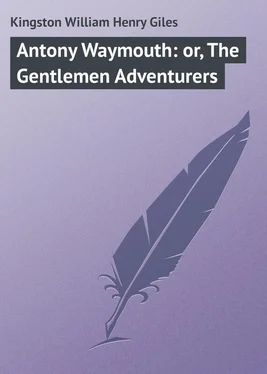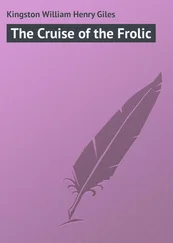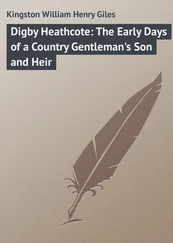William Kingston - Antony Waymouth - or, The Gentlemen Adventurers
Здесь есть возможность читать онлайн «William Kingston - Antony Waymouth - or, The Gentlemen Adventurers» — ознакомительный отрывок электронной книги совершенно бесплатно, а после прочтения отрывка купить полную версию. В некоторых случаях можно слушать аудио, скачать через торрент в формате fb2 и присутствует краткое содержание. Жанр: foreign_prose, foreign_children, на английском языке. Описание произведения, (предисловие) а так же отзывы посетителей доступны на портале библиотеки ЛибКат.
- Название:Antony Waymouth: or, The Gentlemen Adventurers
- Автор:
- Жанр:
- Год:неизвестен
- ISBN:нет данных
- Рейтинг книги:4 / 5. Голосов: 1
-
Избранное:Добавить в избранное
- Отзывы:
-
Ваша оценка:
- 80
- 1
- 2
- 3
- 4
- 5
Antony Waymouth: or, The Gentlemen Adventurers: краткое содержание, описание и аннотация
Предлагаем к чтению аннотацию, описание, краткое содержание или предисловие (зависит от того, что написал сам автор книги «Antony Waymouth: or, The Gentlemen Adventurers»). Если вы не нашли необходимую информацию о книге — напишите в комментариях, мы постараемся отыскать её.
Antony Waymouth: or, The Gentlemen Adventurers — читать онлайн ознакомительный отрывок
Ниже представлен текст книги, разбитый по страницам. Система сохранения места последней прочитанной страницы, позволяет с удобством читать онлайн бесплатно книгу «Antony Waymouth: or, The Gentlemen Adventurers», без необходимости каждый раз заново искать на чём Вы остановились. Поставьте закладку, и сможете в любой момент перейти на страницу, на которой закончили чтение.
Интервал:
Закладка:
As soon as the fight was over, Waymouth hastened to look for his friend. He found him below in the hands of the surgeon. Raymond bore the pain bravely. Waymouth congratulated him.
“You’ve had a taste of what a sea fight is like, Ned,” he observed. “Maybe before we get back to Old England we may have to count scores such, for, no doubt, the Portugals and Spaniards, and even the Hollanders, will give us plenty of occasions to prove our valour.”
Raymond replied that he was ready for another fight, and should be willing to meet the foes of England wherever they were to be found.
It appeared probable that he would at once have another opportunity, for, as daylight broke, a large ship was discerned bearing down on them under all sail. She was the Portugal. The Lion’s crew flew to their guns, and as she came near plied her so well with their shot that she was fain to sheer off, and to stand down towards the river’s mouth. As she stood away, an officer of rank – so he seemed by his fine garments and feather in his cap – sprang on the aftercastle, and, shaking his fist, cried out through his trumpet —
“We shall meet you again ere long, you hated English, and then we shall have our revenge.”
“Let the dog bark who runs away. Though he shows his teeth he dare not use them,” exclaimed Waymouth with a scornful laugh.
The increasing light had shown some way astern the topmasts of a ship out of the water, crowded with people. Was the foundered ship a friend or foe? As soon as they were clear of the Portugal ship two boats were lowered, and made towards the spot where the masts appeared. At the same time several boats were seen putting off from the shore, clearly belonging to Spaniards. When they, on their part, beheld the English approaching, fearing their prowess, from which they had suffered so much, they put back, leaving their countrymen to their fate.
The poor people on the masts, who had been clinging there for the greater part of the night, held out their hands, imploring succour. This English sailors have ever been ready to give to those in distress, whether friends or foes. The boats, therefore, approached to take off the nearly-exhausted people. Waymouth, who was in the first boat, perceived, as he fancied, the flutter of a female’s dress. On the cross-trees, just above the water, lay a young lady, her head resting on the arm of an old and dignified-looking man, while the two were further supported by four or five faithful seamen who clung near them. The seamen waved their hands to attract the notice of the English.
“Take this lady off first,” they cried out. “Save her and her father; mind not us.”
Waymouth required no further inducement to exertion than the sight that feminine gear had excited. The Spanish seamen refrained from leaping into the boat as she came up to the mast, allowing Waymouth to climb up and release the lady from her painful and perilous position. Carefully he lifted her into the boat, and placed her in the after-part.
“Oh, meu pai! meu pai!” she cried out in the tongue of the Portugals – “Oh, my father! my father!”
“Have no fear, fair lady,” cried Waymouth, who understood it slightly; “he is safe.” And, springing back, he assisted the old gentleman into the boat. The latter, as far as his exhausted slate would allow, expressed his thanks.
Not till now did the Spanish seamen descend into the boat. As soon as he had received as many as she could carry, Waymouth returned with them to the Lion. The care of the surgeon and good Master Walker soon restored the young lady – for young she was and beautiful – to a state of consciousness and quietude. Her nerves had been sorely shaken by the combat, the sinking of the ship, and terrible danger to which she had been exposed. Her father, the old gentleman, was, it appeared, Don Joao Pinto d’Almeida, the governor of a Portugal settlement in the East; she was the Donna Isabel d’Almeida, his only child. Though Portugals, they had taken passage aboard this Spanish ship, intending to proceed on their farther voyage in the one which had escaped and left them to their fate. The Portugal ship was the Santa Barba, and her captain Don Pedro de Lima. Don Joao seemed glad to hear that the Santa Barba had escaped capture, and supposed that in the darkness Don Pedro had not seen the wreck. Meantime most of the people from the masts had been rescued and brought on board the Lion.
While the boats were thus engaged, firing was heard, and several ships were seen approaching, hotly engaged, down the mighty Plate stream, compared to which the rivers of Europe seem but purling brooks. It was a sad fate for the poor wretches on the masts to be thus left to starve or fall off and be drowned, but there was no time for delay. The Lion lifted her anchor, and made sail to join in the combat. Her rigging had been repaired as far as practicable, so that she was fresh for the fight. The rest of the English squadron and four Spaniards or Portugals were observed fiercely exchanging shots with each other. The enemy, probably, had already enjoyed a sufficient taste of the quality of the English to be tired of the fight, for no sooner was the Lion observed drawing near with drums beating, trumpets braying forth defiance, and ordnance speaking a still more decided language, than they steered for the shore on either side, and ran hard and fast aground. Some of the people in the enemy’s ships took to their boats, others leaped overboard and swam to the shore, and several were seen running backwards and forwards at their wits’ end, the English cannon thundering furiously at them; while a few bold spirits stood at their quarters, and returned the fire from their own pieces. However, they could not long maintain the unequal fight; flames burst forth from the ports of the ships, and one after the other, before any booty could be obtained from them, they blew up, till not a Spaniard remained to dispute the passage of the river. Now the English admiral thought fit to anchor his fleet opposite a pleasant spot near the mouth of the river, and, the larger number of the company landing, a fort was erected to guard against surprise, and the repairing of the ships commenced.
As yet they had gained much of what men call glory and renown, concerning the value of which there may be some dispute; but they had obtained no booty, about the desirableness of which there cannot be two opinions. So thought the adventurers. They were all eager, therefore, to proceed to the East, where they expected to find it in abundance, and accordingly hurried on the refitting of the ships. It was well that they did so, for scarcely was the squadron once more clear of the land than a large fleet was seen approaching the mouth of the river. The English ships stood on their course, for the strangers, undoubtedly Spaniards and Portugals, were too numerous to be trifled with. The enemy were soon seen to make sail in chase. The English set all their canvas, not to avoid the fight, but to separate the ships of the enemy, so as to deal first with the faster sailers. The plan answered; but the leading Spanish ships soon got such a taste of the guns of the Dragon, the Serpent, and the Lion, that they dropped astern, the rest not deeming it prudent to take their places, content with boasting that they had put an English squadron to flight.
Thus triumphantly the English ships sailed on their way across the Atlantic till they neared the Cape Bona Spei, or Bona Speranza, as in those days the Cape of Good Hope was frequently called. Once more they dropped anchor in Saldanha Bay, a place at which most vessels sailing to Cathay were wont to touch. The common people among the prisoners had been left on shore in America; but the officers and the Portugal governor and his daughter, and some attendants, had been carried on, the admiral deeming that they might be useful to exchange with any English persons of quality who might have been captured by the Portugals; or, if not, that a good ransom might be obtained for them. Don Joao and Donna Isabel remained accordingly on board the Lion, where Captain Wood, as did his young lieutenant, paid them all the attention in their power.
Читать дальшеИнтервал:
Закладка:
Похожие книги на «Antony Waymouth: or, The Gentlemen Adventurers»
Представляем Вашему вниманию похожие книги на «Antony Waymouth: or, The Gentlemen Adventurers» списком для выбора. Мы отобрали схожую по названию и смыслу литературу в надежде предоставить читателям больше вариантов отыскать новые, интересные, ещё непрочитанные произведения.
Обсуждение, отзывы о книге «Antony Waymouth: or, The Gentlemen Adventurers» и просто собственные мнения читателей. Оставьте ваши комментарии, напишите, что Вы думаете о произведении, его смысле или главных героях. Укажите что конкретно понравилось, а что нет, и почему Вы так считаете.












